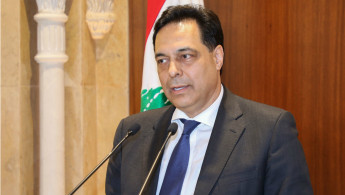Lebanon blast judge subpoenas caretaker PM Hassan Diab
The lead investigator into Beirut's massive port explosion subpoenaed Lebanon's caretaker premier for interrogation next month after he failed to show up for questioning on Thursday, a judicial source said.
Judge Tareq Bitar ordered the security forces to bring outgoing prime minister Hassan Diab to the main courthouse in the capital 24 hours before the new date, September 20, the source said.
A huge stockpile of ammonium nitrate exploded at the port on August 4 last year, destroying swathes of the city and killing at least 214 people.
It later emerged that officials had known the highly volatile fertiliser had been stored there, close to residential neighbourhoods, for years.
But a probe into the disaster has so far failed to hold anyone to account, and activists accuse politicians of doing everything they can to stall the investigation.
Bitar has previously summoned four former ministers - three of whom are lawmakers - but parliament has refused to lift their immunity so they can be questioned.
The outgoing interior minister has also refused to allow the questioning of top intelligence chief Abbas Ibrahim.
Powerful Shia movement Hezbollah has accused the judge of "politicising" the probe.
The judicial source said the subpoena followed a letter on Wednesday from the cabinet's administration claiming "constitutional obstacles" prevented the caretaker premier from appearing before the judge, an argument Bitar said had "no legal value".
On Thursday, several former prime ministers issued a statement denouncing Bitar's subpoena move, calling it "a dangerous precedent and a deliberate measure that undermines the position of the prime minister".
On Wednesday, Bitar attended a re-enactment of welding work that happened in the hours before the explosion, the National News Agency reported.
Security sources initially suggested that welding work could have started the fire, but experts have since dismissed that theory as unlikely and an attempt to shift the blame for high-level failings.
Human Rights Watch earlier this month accused Lebanese authorities of criminal negligence over the blast.
Political leaders have repeatedly refused an international investigation, although France has launched its own probe into the deaths of some of its nationals in the explosion.
In February, Bitar's predecessor was removed by a court after he charged Diab and three former ministers with "negligence and causing death to hundreds" in the explosion, a move widely condemned by the political class.




 Follow the Middle East's top stories in English at The New Arab on Google News
Follow the Middle East's top stories in English at The New Arab on Google News


